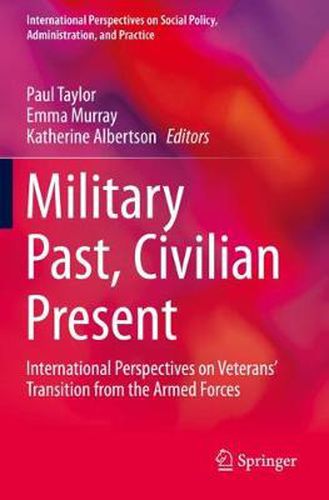Readings Newsletter
Become a Readings Member to make your shopping experience even easier.
Sign in or sign up for free!
You’re not far away from qualifying for FREE standard shipping within Australia
You’ve qualified for FREE standard shipping within Australia
The cart is loading…






This title is printed to order. This book may have been self-published. If so, we cannot guarantee the quality of the content. In the main most books will have gone through the editing process however some may not. We therefore suggest that you be aware of this before ordering this book. If in doubt check either the author or publisher’s details as we are unable to accept any returns unless they are faulty. Please contact us if you have any questions.
This edited book presents a synthesis of current international knowledge on the topic of military veteran transition to civilian life. Understanding the transition of individuals from military institutions to civilian life is of great importance. The essential elements of transition support are currently widely debated in order to assess current practice and potential shortcomings in the intention to improve health, welfare and social outcomes for military veterans.
This text links original research and critical commentary to public policy and practice in the area of veteran transition. Doing so through a collection of international perspectives assists in locating continuity and difference between strategies, agendas and the realities of what is actually known of the veteran’s experience.
Chapters in this text examine the subject of transition along lines of enquiry that focus in on themes such as social justice, veteran identity and developments in transition agendas. Globally, many veterans face complex social issues such as low income, barriers to employment, and problems of health and welfare. Chapters take stock of the real-world issues affecting veterans and at the same time casts a critical eye over the limitations in accessing, or denial of access to opportunities, support and remedy. The veteran identity is an important dimension of enquiry here. This book looks at the relational factors between the veteran and the public, the creation of a master status and the challenges faced by veterans in transitioning into a cultural context that is saturated with imagery of what a veteran ‘is’. Chapters also seek to pose recommendations as to how the policy and practice agenda that surrounds veterans and the bridging of the gap between military and civilian life may be developed. Here authors point towards the value of knowledge, research and analysis that is underpinned by participatory strategies with veterans themselves. For example, seeking to establish lines of enquiry that value the voice of veterans as an ongoing and iterative dimension of developing understanding.
$9.00 standard shipping within Australia
FREE standard shipping within Australia for orders over $100.00
Express & International shipping calculated at checkout
This title is printed to order. This book may have been self-published. If so, we cannot guarantee the quality of the content. In the main most books will have gone through the editing process however some may not. We therefore suggest that you be aware of this before ordering this book. If in doubt check either the author or publisher’s details as we are unable to accept any returns unless they are faulty. Please contact us if you have any questions.
This edited book presents a synthesis of current international knowledge on the topic of military veteran transition to civilian life. Understanding the transition of individuals from military institutions to civilian life is of great importance. The essential elements of transition support are currently widely debated in order to assess current practice and potential shortcomings in the intention to improve health, welfare and social outcomes for military veterans.
This text links original research and critical commentary to public policy and practice in the area of veteran transition. Doing so through a collection of international perspectives assists in locating continuity and difference between strategies, agendas and the realities of what is actually known of the veteran’s experience.
Chapters in this text examine the subject of transition along lines of enquiry that focus in on themes such as social justice, veteran identity and developments in transition agendas. Globally, many veterans face complex social issues such as low income, barriers to employment, and problems of health and welfare. Chapters take stock of the real-world issues affecting veterans and at the same time casts a critical eye over the limitations in accessing, or denial of access to opportunities, support and remedy. The veteran identity is an important dimension of enquiry here. This book looks at the relational factors between the veteran and the public, the creation of a master status and the challenges faced by veterans in transitioning into a cultural context that is saturated with imagery of what a veteran ‘is’. Chapters also seek to pose recommendations as to how the policy and practice agenda that surrounds veterans and the bridging of the gap between military and civilian life may be developed. Here authors point towards the value of knowledge, research and analysis that is underpinned by participatory strategies with veterans themselves. For example, seeking to establish lines of enquiry that value the voice of veterans as an ongoing and iterative dimension of developing understanding.